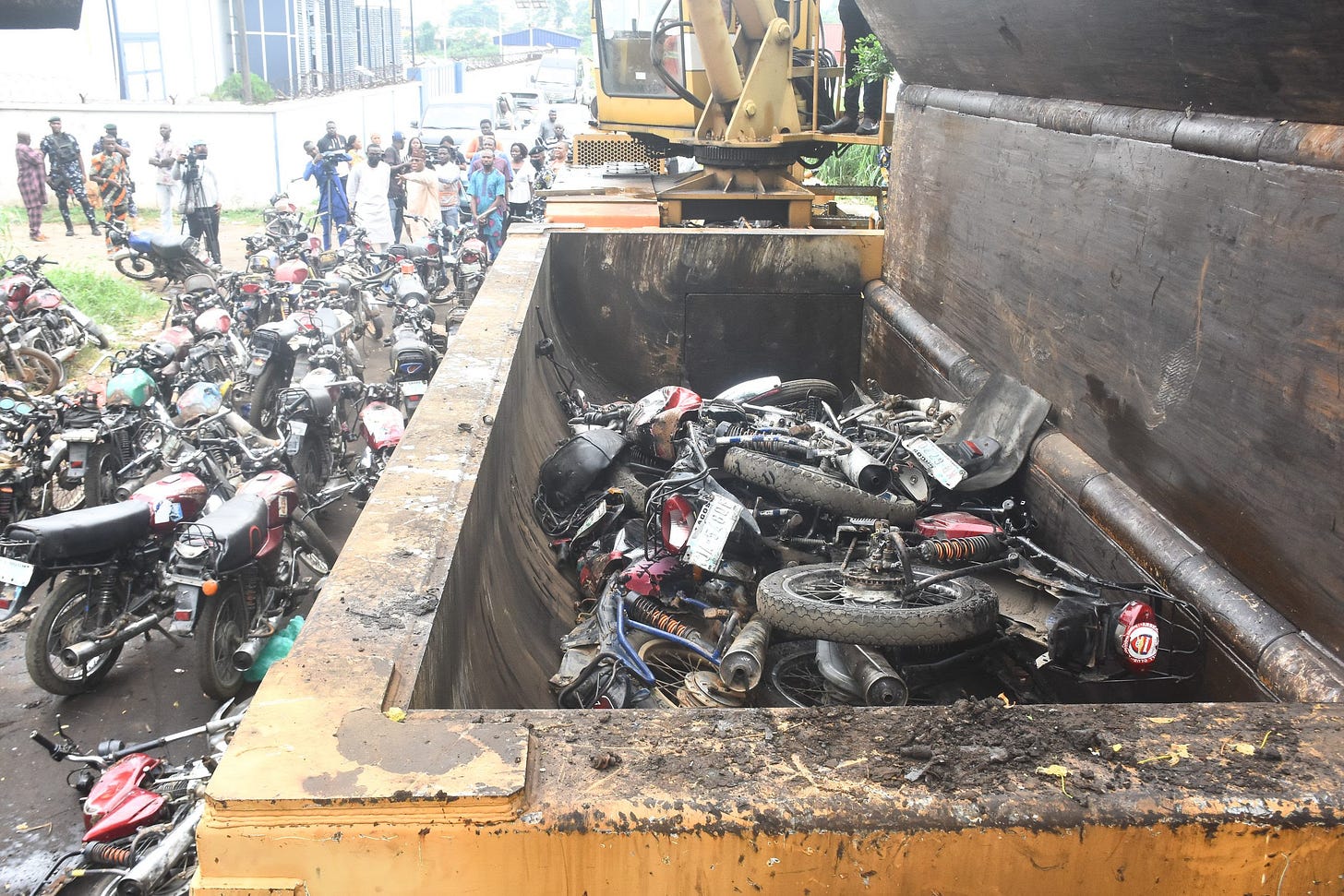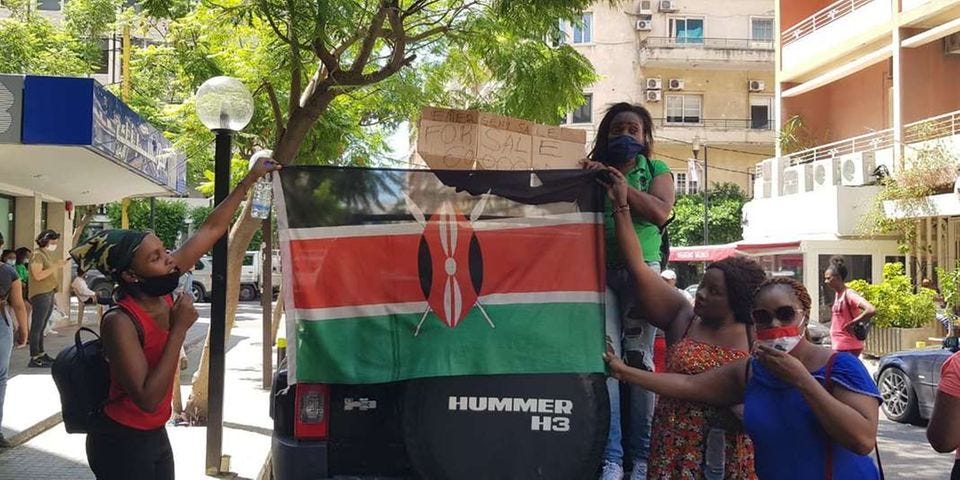Some crush okadas, others build trains
Podcast
Spotify:
For some reason, we had issues embedding the Apple Podcasts link, but you can listen to the episode on Apple Podcasts through this link.
Song
This episode was edited while we were listening to:
Quote of the week
“You think your pain and your heartbreak are unprecedented in the history of the world, but then you read.”
— James Baldwin
What’s Happening in Nigeria?
#OwoMassacre
We are extremely saddened to hear of the #OwoMassacre, which occurred on Sunday. Too many innocent Nigerians have lost their lives senselessly and needlessly; in places where they should be safe and protected. Our deepest sympathies are with anyone connected with those killed in the massacre.
All we can do at this point is to ensure we get out PVCs and to make our voices heard in the next election.



London to Lagos
After a 41-day motorcycle journey from London, 44-year-old Tunde Adeyanju has finally arrived in Lagos to a well deserved heroes welcome. His mission was to raise money for Rotary International’s polio-eradication effort in Africa, in honour of a friend who had suffered from the disease.
He did, however, experience some difficulties and even had some near-death experiences. He described how one of his wheel rims broke in Mali, and how he was robbed of hundreds of dollars in Mauritania.


His motorcycle, now called ‘Eagle’, is currently on display at the Centre for Research, Information Management, and Media Development (CRIMMD) and will be auctioned for N10 million, which will go towards polio eradication.
Okadas crushed
Last month, Governor Babajide Sanwo-Olu of Lagos State declared a fresh ban on commercial motorcycles aka okadas, in select areas of the state.
Now, the government has confiscated 2,000 bikes, which have been crushed. The recent clamp down and crushing was triggered by the killing of Sunday David which was allegedly done by several okada riders. And according to Gbenga Omotoso, Lagos State’s Commissioner for Information and Strategy, okadas were responsible for 45% of the road accidents in the first quarter of 2022.
This is not the first attempt at a ban, though. There have been two failed bans in the last two years and bans have also failed in the previous terms of governors.
“Insanity is doing the same thing over and over and expecting different results.”
— Albert Einstein
And to make matters worse, it seemed like we were approaching a solution when companies like Gokada, Max.ng, and ORide entered the okada space (providing an uber-like service for okadas). But what did the Lagos State government do? It banned them and sent them out of Lagos.
Releaf
Releaf, a Nigerian agritech startup, is teaming up with Volcano International Partnerships, an Israeli company known for its expertise and innovation, to address Africa's food security issues.
Despite Israel’s geographical conditions being unsuitable for agriculture, the country has defied the odds to become the world’s leading agritech nations, and Volcano have been at the fore of this innovation and growth.
Releaf’s Chief Technology Officer, Uzoma Ayogu, “hopes this will set a precedent in other sectors for greater collaboration between these two resilient, complementary, and purposeful ecosystems.” And this collaboration will see Relief identify difficulties in the agricultural value chain, while Volcano provides expertise through training, advisory services, and technology transfer.
What’s Going on Across Africa?
DSTV losing exclusivity
South Africa's ruling party, the African National Congress (ANC), suggested a new policy that would eliminate Dstv's exclusive permission to broadcast national sporting events. DSTV, the satellite television service provided by MultiChoice, a South African media giant, is the preeminent satellite TV service in Africa. The Springboks, Proteas, and Bafana Bafana all currently sell exclusive rights to broadcast their live matches to Multichoice. As a result, a significant number of South Africans who are unable to purchase Dstv Premium miss out on live matches.
The ANC's planned policy isn’t the first of its type. In 2020, the Independent Communications Authority of South Africa (ICASA) recommended that select events in South Africa be made free to watch. Only 12.6 percent of South Africans utilize subscription-based plans and have direct access to live games, according to their research.
This new policy paper does not specify how alternative funding other than Multichoice's input would function, other than granting broadcasting privilege to the SABC. This simply implies that more tax revenue would go to the public broadcaster as funding.
While this is a good action that would reduce Multichoice's anti-competitive behaviour, the committee does not appear to be considering the impact the policy will have on National sports. Multichoice, as a prominent broadcaster, pays huge sums for exclusive broadcasting rights, which support the salaries of athletes and the development of sports teams. Also, when compared to similar services provided outside of Africa, the price of MultiChoice’s offering is much cheaper.
Saied at it again
Tunisian President Kais Saied has dismissed 57 judges. Just when you thought things could not get worse. Not to mention the fact that he has already fired the prime minister of Tunisia, suspended the Tunisian parliament, governed by decree; all the while, Tunisia is in the middle of an economic crisis and citizens are experiencing food shortages.
Last week, we spoke about how some unions threatened a strike in response to Kais Saied’s actions. Well, that strike is scheduled to hold across the entire public sector on June 16.
Too Lissu Too Late?
Tundu Lissu, a former member of the Tanzanian parliament and presidential candidate, announced that the Tanzanian government fully paid his pension and other benefits that were owed to him after he fled the country to Belgium in 2017. For context, he fled because he was shot and wounded by a gunman who remains unidentified till today.
Prior to him leaving, his relations with the president at the time, the now-deceased John Magufuli, had definitely soured as Magufuli was aggressively cracking down on many opposition politicians. But fast forward to now, and things have changed drastically under President Hassan’s regime. President Hassan even went as far as meeting Lissu when she was in Brussels in February—and this meeting is what many believed resulted in an improved relationship between Lissu and the Tanzanian government.
But the bigger story here is that this is yet another example of president Hassan overturning a Magufuli policy, which has had a positive effect on Tanzania’s political and economic climate. She has also lifted bans on media outlets that were previously banned by Magufuli and not to mention that she did a complete u-turn on Magufuli’s covid-denial policy, towards mandating face masks and encouraging vaccines.
Egypt and Siemens
Siemens, the multinational German conglomerate, recently announced that it has signed the largest contract in its 175-year history. The contract is to construct the world's sixth largest rail network for Egypt.
The project would allegedly cover 2000 kilometres across Egypt, connecting cities along the Nile with the Red Sea and the Mediterranean.
Aside from the rail line, the agreement calls for the construction of 40 high-speed trains, each traveling at 230 kilometers per hour and passing through 60 cities, as well as 40 freight trains, 94 regional trains, and 40 depos and freight stations.
The project will cost €8 billion.
Kenyan migrants
Between January and March 2022, 84 Kenyan domestic workers returned home from Lebanon through the International Organisation for Migration (IOM). This was because of mistreatment they had suffered at the hands of their Lebanese employers.
Apparently, many of these workers were deceived by the type of work and/or salary they thought they would receive, and many reported various instances of labour exploitation, such as excessive working hours, unpaid salaries, forced confinement, and even sexual abuse. Many even went as far as staging sit-in protests outside the Kenyan embassy, in order to get back to Kenya.
Another 27 Kenyans are receiving support from the IOM and are in the process of being flown home. All returnees are also being given $1,500 each, which is to assist with reintegration and reestablishing a sustainable livelihood in Kenya.
Other News
South Africa's former spy chief has accused President Cyril Ramaphosa of kidnapping and bribery.
George Wajackoyah, Kenya’s pro-marijuana candidate, has been cleared to run in the country’s upcoming elections.
Nigeria has banned the sale of bushmeat as a precaution to stop the spread of monkeypox and this comes a few days after the Nigerian Centre for Disease Control confirmed that 6 monkeypox cases had been detected in May, which brings the number of cases this year to 21.
Google has rolled out Google TV on iOS devices in 19 African countries.
What in the World?
(The segment where we highlight the most outrageous story we have come across while scraping the web for news articles for you. We have taken to using what we call the Ehn scale. The longer the Ehn the more incredulous. For example, President Buhari is not Nigeria’s most prolific travel blogger: Ehnnnnn? Got it?)
Herbalist meets tribalist’
Rating: Ehn????????? Ojoro cancel ojoro
Editor’s Corner
Nothing this week folks!









